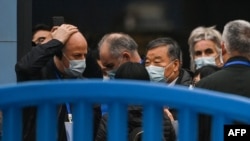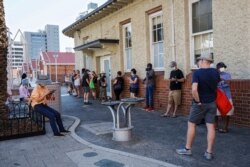A team of World Health Organization scientists investigating the source of the coronavirus visited a wet market Sunday in Wuhan, China.
A cluster of cases were linked to the Huanan Seafood Market when the novel coronavirus first emerged in Wuhan in late 2019. Since then, the coronavirus has infected more than 102 million people worldwide and killed more than 2.2 million.
The scientists have already visited at least one of the hospitals in Wuhan that treated some of the first patients.
"Just back from visit at Jinyintan hospital, that specialized in infectious diseases and was designated for treatment of the first cases in Wuhan," Dutch virologist Marion Koopmans said on Twitter Saturday. "Stories quite similar to what I have heard from our ICU doctors."
The scientists want to know where the virus originated, in what animal, and how it made its way into humans, something that could take years to figure out.
The team is also planning to visit the Wuhan Institute of Virology and laboratories at state facilities, such as the Wuhan Center for Disease Control, according to the Geneva-based WHO.
China recorded over 2,000 domestic cases of the virus in the month of January – the highest monthly total recorded since the end of March 2020, according to the National Health Commission.
The European Union announced Sunday that British company AstraZeneca had agreed to send 9 million more doses of the vaccine to EU countries.
AstraZeneca will also deliver the doses a week earlier than planned, EU Commission President Ursula von der Leyen wrote on Twitter, calling the news a “step forward on vaccines.”
On the African continent, only a handful of countries have been able to begin vaccinating their populations. On Sunday, Ghana announced Sunday that it planned to acquire 17.6 million doses of the vaccine by this summer, with the first batches arriving by March.
"Our aim is to vaccinate the entire population, with an initial target of 20 million people," President Nana Akufo-Addo said Sunday.
He also announced stricter measures against the virus, including banning large gatherings, as the country battles a second wave.
The Associated Press reports that Israel has agreed to transfer 5,000 doses of coronavirus vaccine to the Palestinians for front-line medical workers. Israel has been criticized for not providing vaccines to the Palestinians before but says it is not responsible for them.
The Australian city of Perth is on lockdown orders after a security guard at a quarantine facility tested positive for the coronavirus. Perth had not had a COVID-19 case in 10 months.
The lockdown starts Sunday evening and ends Friday evening, if no more cases are uncovered. People will only be allowed out for essentials, including shopping for groceries and medicine. Bars, gyms and entertainment venues will be closed.
Peru also instituted lockdowns on Sunday amid a new surge in cases, but the Associated Press reported that the regulations were largely ignored, with most markets in Lima crowded as usual.
Russia reported Sunday that there had been more than 18,000 new COVID-19 cases in the previous 24 hours.
The U.S. remains the country with the most cases at more than 26 million, followed by India with 10.7 million and Brazil with 9.1 million, the Johns Hopkins Coronavirus Resource Center said early Sunday.
Data reported by the Associated Press and The New York Times has shown disparities between the racial makeup of the country and who is receiving the vaccine.
In North Carolina, Black people are just a scant 11% of the vaccine recipients even though they are 22% of the population and 26% of the health care workforce, the AP found.
In comparison, AP reported, “White people in North Carolina are 68% of the population and 82% of those vaccinated.”
Meanwhile, The New York Times reported that Los Angeles County data has also revealed racial disparities in the coronavirus pandemic. The mostly Latino neighborhood of Pacoima, the Times said, “has one of the highest case rates in the nation ... roughly five times the rate of COVID-19 cases as much richer and whiter Santa Monica.”






